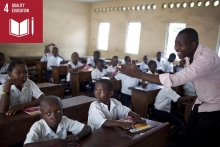School support services and the World Bank’s penchant for privatization

The privatization of public education threatens to rip apart the institutional conditions that guarantee universal access and promote students’ educational achievement. In 1960, UNESCO promulgated its Convention against Discrimination in Education[1] that recognizes the universal right to education. In 2015 the United Nation’s Sustainable Development Goals promoted Goal 4: Ensure inclusive and quality education for all and promote lifelong learning.[2] The right to a quality public education for all is now jeopardized by the global push to privatize educational institutions, including administrative support and professional-technical activities that are essential to the delivery of universally accessible, quality public education.
The push to privatize is embraced by The World Bank Group. The World Bank highlights its “Economics of Education” as a responsible approach toward meeting “excess demand” for education in developing countries. This approach serves to justify the World Bank’s penchant for privatization of public education. It claims,
“The main rationale for Public-Private Partnership (PPP) programs is the potential role of the private sector for expanding equitable access and improving learning outcomes. In low-income countries excess demand for schooling results in private supply when the state cannot afford schooling for all. In high-income countries, however, "differentiated" demand leads to a demand for private schooling, as a sophisticated clientele demands different kinds of schools. By providing demand-side financing and contracting private organizations to provide support services, governments can provide better choices to parents and grant them an opportunity to fully participate in their children’s schooling.”[3]
The World Bank does not effectively document its argument that the private sector can efficiently provide public education and support services.
Focusing on school support services, the World Bank asserts that
“Non-instructional activities, including building maintenance, pupil transportation, and school meals, are often very costly for public schools. In the few cases where good cost analyses have been done, these services have often been found to cost significantly more in public schools than in private schools (World Bank 2009:10).”
The World Bank points to “good cost analyses,” in both its 2006 and 2009 reports, but does not offer any primary or secondary source to back its claim that government delivered school support services are inefficient. Rather, the World Bank’s arguments rest almost exclusively on its 2006 case study of Colombia. However, this case study’s methodology pivots on the private contracting of educational services to increase the coverage (enrollment) and does not compare the costs or quality of school support services provided by public and privately operated schools in Colombia. There is no evidence from either the World Bank’s 2006 or 2009 reports that indicates that outsourcing of school support services lowers costs, increases quality, advances educational achievement, or renders public educational systems more transparent.
Worse yet, the World Bank argues that there is a cost saving associated with contractors being able to hire non-unionized labor (World Bank 2009:10). The World Bank makes no effort to research the impacts of unionized workers on the efficiency and quality of school support services or the educational achievement of students. Indeed, its focus on the case of Colombia suggests that the bank ignores the systematic violations of the International Labor Organization’s core conventions on workers’ rights in its advocacy of public-privatize partnerships in education.[4] The World Bank’s penchant for privatization rests upon poor documentation of results and reflects an institutional neglect of the critical links between educational support services and students’ access to learning opportunities and educational achievement. In essence, the World Bank assumes that privatization lowers costs, and that such savings will be invested in expanding educational opportunities for students. This dangerous assumption opens the door to predatory forms of privatization that can lead to discrimination against students, the violation of educational workers’ universal rights to form a union and collectively bargain with their employers, breaches of contractual transparency and political accountability, and higher costs for poor quality, outsourced services.
Public Services International (PSI) is fighting for universal access to quality public education and against the privatization of educational and school services around the world. At its 2012 World Congress, PSI resolved that:
Education support workers provide essential services from the early childhood level straight through to university. However, their contributions often go unrecognized, and that lack of respect manifests itself all too frequently in poor pay and working conditions and inadequate training. Many education support workers are forced to accept part-time or precarious positions without job security.[5]
PSI’s Educational Support and Cultural Workers (ESCW) network was founded in 2014 to advance education as a human right, guarantee equal access to quality public education for all, and fight against efforts that seek to turn public education for all into private profit for a few.
[1] UNESCO. “The Planned Development Of Primary Education And The Quest For Greater Relevance To The Environment.” 1960 and accessed at: http://www.unesco.org/education/educprog/50y/brochure/tle/132.htm.
[2] United Nations. Sustainable Development Goals: Goal 4. 2015 and accessed at: http://www.un.org/sustainabledevelopment/education/.
[3] The World Bank. “Economics of Education.” August 25, 2014 and accessed at: http://www.worldbank.org/en/topic/education/brief/economics-of-education.
[4] The United States government continues to document labor rights violations in Colombia under the terms of the bilateral trade agreement. While there has been modest improvement in recent years, the report offers a documented country experience of organized violence against trade unionists with prevailing impunity. See “The Colombian Labor Action Plan: A Five Year Update” here: https://www.dol.gov/ilab/reports/pdf/2016_Colombia_action_plan_report_FINAL.pdf.
[5] Public Services International. 2012 World Congress Resolutions. Resolution #33 and accessed at: http://www.world-psi.org/en/congress-resolution-33-education-support-workers.

